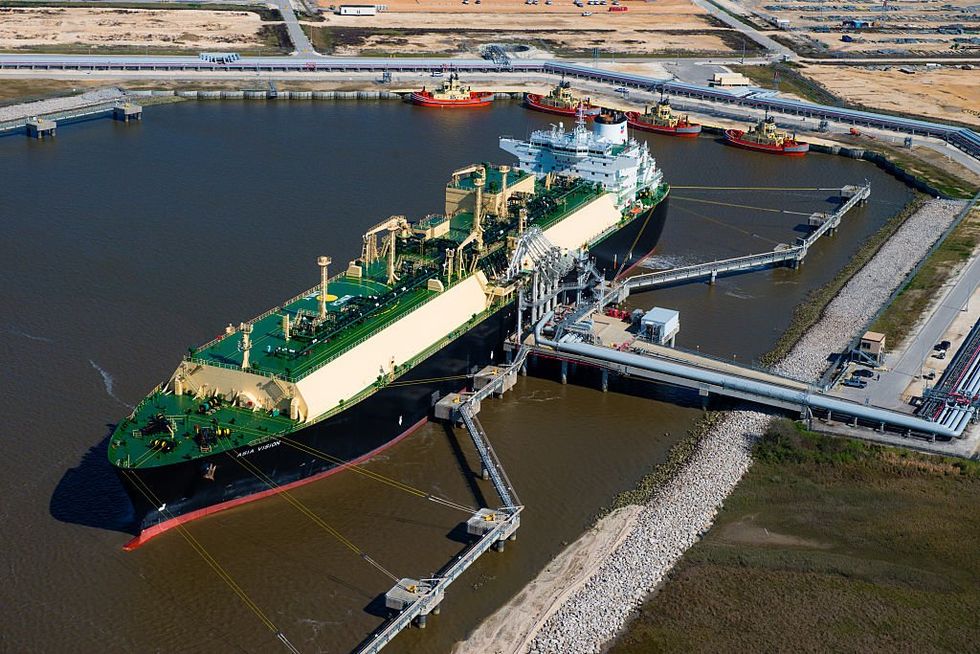US energy independence is under threat from a court ruling
Two new energy enterprises in the Port of Brownsville were on the cusp of ushering in a new era of business and industry for the region. Together, they would bring in billions of dollars in investment, provide major infrastructure improvements, and create thousands of jobs.And they would lead to a domino effect of benefits for the community, such as the $30 million Texas A&M training facility that broke ground at the port this year.This is not governmental cooperation through agency and legal means. It’s obstructionist.Both projects received the green light in the federal permitting process, and one had even begun construction.But then everything came to a screeching halt at the whim of a court in Washington, D.C.For the sake of the people of South Texas, this unprecedented move — tossing out preapproved permits, including one for a facility that is already under construction — needs to be challenged.The Rio Grande LNG terminal, projected to be one of the world's largest liquified natural gas export projects, would cost an estimated $18 billion. It is expected to generate 5,000 construction jobs, over 400 permanent positions, and potentially another 3,000 indirect jobs in the local community.Meanwhile, Texas LNG was finalizing its investment plans to start construction. This project, too, was set to invest billions and create thousands of jobs throughout its construction phase.The Federal Energy Regulatory Commission had approved permits for both projects. The companies went above and beyond to comply with environmental regulations, even incorporating a carbon capture and storage facility to reduce emissions. Ironically, the court cited these environmental efforts as the reason to revoke their permits. In response, both projects have now abandoned their carbon capture efforts to comply with the court’s demands.As Charles McConnell, a former official in the Environmental Protection Agency under the Obama administration, wrote, “This is not governmental cooperation through agency and legal means. It’s obstructionist.”U.S. Sen. Ted Cruz (R-Texas) has urged FERC to appeal a court decision that halted the construction of two major liquefied natural gas terminals. Cruz’s letter to the FERC chairman stressed the need for regulatory clarity to ensure that legal disruptions do not discourage investors from backing future projects that could position America as the world’s leading energy producer.“If project developers come to believe that federal permits can be overturned due to procedural missteps by the regulator, apart from any actions or fault by the developers, U.S. infrastructure projects will slow and stall,” Cruz wrote.But for the people of South Texas, this outlandish reversal is a lot more personal. We need more industry and business to help our region flourish. The projects were expanding business access to South Texas significantly. Rio Grande LNG was already in the process of making the channel another 10 feet deeper to make the Port of Brownsville accessible to more ships. With the federal court ruling, all that progress will come to an end — and with it, a golden opportunity to turn South Texas into a hub of prosperity.It’s easy to get lost in the legal jargon of the permitting process and lawsuits. But what FERC and the courts do has real-world implications for everyone in South Texas. More industry leads to more jobs, and more jobs lead to more opportunities, which in turn would create more opportunities for South Texans to escape poverty.The new LNG developments could set the region up for success in decades to come — but not if bureaucratic obstructionists continue to stand in the way.


Two new energy enterprises in the Port of Brownsville were on the cusp of ushering in a new era of business and industry for the region. Together, they would bring in billions of dollars in investment, provide major infrastructure improvements, and create thousands of jobs.
And they would lead to a domino effect of benefits for the community, such as the $30 million Texas A&M training facility that broke ground at the port this year.
This is not governmental cooperation through agency and legal means. It’s obstructionist.
Both projects received the green light in the federal permitting process, and one had even begun construction.
But then everything came to a screeching halt at the whim of a court in Washington, D.C.
For the sake of the people of South Texas, this unprecedented move — tossing out preapproved permits, including one for a facility that is already under construction — needs to be challenged.
The Rio Grande LNG terminal, projected to be one of the world's largest liquified natural gas export projects, would cost an estimated $18 billion. It is expected to generate 5,000 construction jobs, over 400 permanent positions, and potentially another 3,000 indirect jobs in the local community.
Meanwhile, Texas LNG was finalizing its investment plans to start construction. This project, too, was set to invest billions and create thousands of jobs throughout its construction phase.
The Federal Energy Regulatory Commission had approved permits for both projects. The companies went above and beyond to comply with environmental regulations, even incorporating a carbon capture and storage facility to reduce emissions. Ironically, the court cited these environmental efforts as the reason to revoke their permits. In response, both projects have now abandoned their carbon capture efforts to comply with the court’s demands.
As Charles McConnell, a former official in the Environmental Protection Agency under the Obama administration, wrote, “This is not governmental cooperation through agency and legal means. It’s obstructionist.”
U.S. Sen. Ted Cruz (R-Texas) has urged FERC to appeal a court decision that halted the construction of two major liquefied natural gas terminals. Cruz’s letter to the FERC chairman stressed the need for regulatory clarity to ensure that legal disruptions do not discourage investors from backing future projects that could position America as the world’s leading energy producer.
“If project developers come to believe that federal permits can be overturned due to procedural missteps by the regulator, apart from any actions or fault by the developers, U.S. infrastructure projects will slow and stall,” Cruz wrote.
But for the people of South Texas, this outlandish reversal is a lot more personal. We need more industry and business to help our region flourish. The projects were expanding business access to South Texas significantly. Rio Grande LNG was already in the process of making the channel another 10 feet deeper to make the Port of Brownsville accessible to more ships. With the federal court ruling, all that progress will come to an end — and with it, a golden opportunity to turn South Texas into a hub of prosperity.
It’s easy to get lost in the legal jargon of the permitting process and lawsuits. But what FERC and the courts do has real-world implications for everyone in South Texas. More industry leads to more jobs, and more jobs lead to more opportunities, which in turn would create more opportunities for South Texans to escape poverty.
The new LNG developments could set the region up for success in decades to come — but not if bureaucratic obstructionists continue to stand in the way.
Originally Published at Daily Wire, World Net Daily, or The Blaze
What's Your Reaction?

































































































